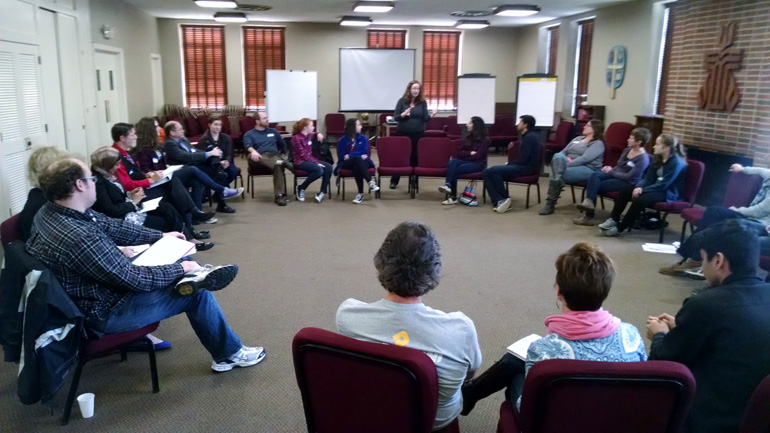
The Kansas City Interfaith Youth Alliance held a workshop Jan. 30 at Second Presbyterian Church in Kansas City, Mo. (Bill Tammeus)
In a nation with an increasingly varied religious landscape, how can we Americans learn to live in religious harmony?
One answer is to teach young people that they need not fear pluralism. That can allow individuals to have a deep commitment to a faith tradition while also respecting the different commitments others make.
That's why the Kansas City Interfaith Youth Alliance exists and why it recently held a workshop at my church. More than 25 youth and adults gathered to learn how to share their faith stories and how to hear and learn from the stories of others.
They were led by Hannah Kardon, who pastors a United Methodist Church in Chicago, and Hind Makki, a Muslim interfaith educator living just south of Chicago.
The interfaith youth movement, Hannah told the group, "has the potential to save our world today."
Sound like starry-eyed hyperbole? It's not. It is, rather, a realistic view of the need to learn how to live in a nation and world in which religion plays an important role in nearly every major news story.
KCIYA was inspired by the Interfaith Youth Core, founded by Eboo Patel. My friend Jon Willis, a member of my Presbyterian congregation, heard Patel speak a few years ago and was moved to gather Muslim, Christian, Jewish, Hindu and other youths in this area to engage in interfaith dialogue and service projects together.
What Patel, Kardon, Makki and others have learned is that it's best in an interfaith setting to start with individual stories.
As Kardon noted, "We, fundamentally, as humans are narrative beings."
So people at this workshop collected in groups of two and three to share how they came to be interested in cross-faith discussions. I looked across the room and saw a young Jewish girl speaking with a member of my Presbyterian congregation. They were looking each other in the eye and listening. And the fact is, everything changes when you look someone in the eye. You begin to find what I found as a boy who lived two years of my childhood in India -- all people of any faith are, at base, very much the same, despite differences in beliefs.
In this conversation time, I spent time talking with a Christian of a different denomination and with a Muslim woman whose family had come to the U.S. from Sudan before she was born.
These conversations need not be scary. But they also need not be opportunities to describe in harsh terms how the other person's religion is false and yours has all the answers.
In our workplaces, schools and neighborhoods now we are finding a wide range of religious traditions represented. The predominance of Christianity in America hasn't ended, but when the religiously unaffiliated represent now some 23 percent of the adult population and when we're finding Islamic mosques, Sikh gurdwaras and Hindu temples springing up in previously homogeneous communities, it's time to learn how to live with one another respectfully. And we do that first by sharing our own stories.
As Hind said, in this era of social media, "everybody has the opportunity to tell his or her story."
Hannah's own story begins in a non-religious family in which one parent grew up Catholic, one Lutheran. But they essentially abandoned both traditions and wanted their children to make their own choice. She lived as a child for almost a decade in Japan and then Hong Kong, finding that "I was surrounded by people of many different religions."
Eventually, "in my late teens I converted to Christianity."
As she told this story, everyone was zeroed in on it. Had she simply started preaching a Methodist sermon, she'd have lost her multi-faith audience.
So now we have a few more young people who know that interfaith connections need not be frightening and that they are necessary. One day one of them might help prevent bigotry and violence.
[Bill Tammeus, a Presbyterian elder and former award-winning Faith columnist for The Kansas City Star, writes the daily "Faith Matters" blog for The Star's Web site and a column for The Presbyterian Outlook. His latest book is Jesus, Pope Francis and a Protestant Walk into a Bar: Lessons for the Christian Church. E-mail him at wtammeus@gmail.com.]
Editor's note: We can send you an email alert every time Bill Tammeus' column, "A small c catholic," is posted to NCRonline.org. Go to this page and follow directions: Email alert sign-up.



